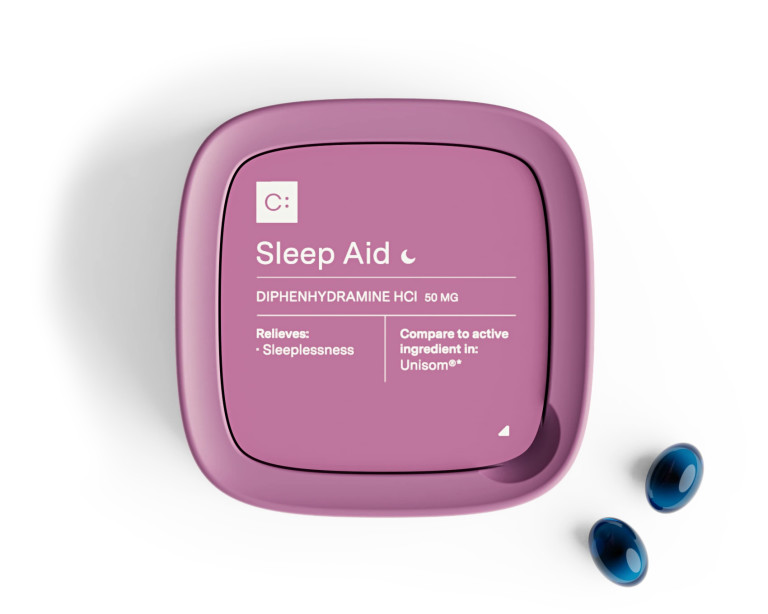So, what does melatonin do?
Melatonin is a natural sleep-inducing hormone produced by the pineal gland in your brain. This hormone helps to regulate your circadian rhythm, a natural process that influences your daily sleep-wake cycle. Melatonin secretion increases as your body senses it’s getting dark, and the hormone is present in high amounts throughout the night to promote sleepiness. In contrast, the amount of melatonin is much lower during the day to promote wakefulness. Light (even dim light) can interfere with melatonin production. This is why sleep specialists recommend staying off your phone or laptops before bedtime, as the bright blue glow can decrease levels of melatonin and make it more difficult for you to fall asleep.
The American Insomnia Survey1 found that over 50% of adults in America experience poor sleep quality or sleep difficulties.2 For a lot of people, poor sleep habits, psychological factors, and physical ailments may be the main barriers to getting quality sleep. It may be easy to think that melatonin is the solution to these problems. However, according to the NIH's National Center for Complementary and Integrative Health (NCCIH),3 melatonin supplements aren’t appropriate for all sleep issues. Research shows that use of melatonin is best in certain short-term scenarios for:

1. Jet lag
Have you ever felt like a walking zombie after getting off a flight that crosses multiple time zones? Time zone changes can alter sleep patterns and make it tough to go to sleep at night, wake up at normal hours, or feel awake throughout the day (daytime drowsiness). Symptoms of jet lag4 may impact everything from mood to digestion.
How can melatonin help? To help adjust your circadian rhythm to the new time zone, take doses of melatonin one to two hours before bedtime. Some studies have found that also taking melatonin three days before and after your trip may be helpful. Pair melatonin with bright light exposure to mimic time zone changes to really get your sleep-wake cycle prepared for travel or back on track.
2. Insomnia
There can be several reasons for why you have insomnia,5 according to the American Academy of Sleep Medicine (AASM). Some common causes include:
Stress
Sleep disorders, like restless legs syndrome (RLS) or sleep apnea
Mental health conditions
Medication side effects
Alcohol or caffeine consumption
Environmental factors including room temperature, outside noise, snoring roommates, or restless pets
Poor sleep hygiene
Melatonin is not recommended for long-term use to treat chronic insomnia (trouble falling or staying asleep that lasts more than one month). Chronic insomnia usually has an underlying cause, so if you’ve been struggling with sleep for a while, it may be best to meet with a sleep specialist to really explore the root cause of these sleep problems. During these meetings you might learn:
Stress management strategies
How to develop a consistent bedtime routine based around your work schedule
Sleep hygiene tips and what specific habits you should to adopt or avoid (i.e. avoiding daytime naps, identifying sleep disturbances, adjusting sleep time, getting fresh air, readjusting your caffeine schedule)
How can melatonin help? Your healthcare provider or friendly neighborhood pharmacist may recommend using melatonin for occasional bouts of insomnia. If you’ve been experiencing a couple sleepless nights, melatonin may be a good option to help you get your sleep schedule back on track.
3. Delayed Sleep-Wake Phase Disorder (DSWPD)
Have you always been a night owl? Some people have what healthcare providers call delayed sleep-wake phase disorder. This is when your sleep-wake cycle is delayed hours past what is considered normal or socially acceptable. Your internal clock may tell you that it’s time to go to bed well after 2 a.m. This is a common problem for adolescents.
Sleeping at 2 a.m. may not be the biggest problem if you have a schedule or lifestyle that can support waking up after 10 a.m. But if you have to be up in the morning for work or school, you may have some trouble. The Centers for Disease Control and Prevention (CDC) recommends that adults get at least 7 hours of sleep per night.6 Not getting enough sleep can put you at risk for daytime sleepiness, cognitive and mood issues, and long-term health problems.
How can melatonin help? Melatonin can help you shift your sleep phase backward to be more in line with your daily schedule. You can take melatonin one hour before your desired bedtime. This supplement can prepare you for bed by making you feel tired at the intended time. Try to stick with a regular sleep-wake schedule for the best results!
A summary on what you need to know
We talked about 3 common scenarios where taking melatonin may be a great option. Melatonin can also be effective for sleep problems in: people who work night shifts or perform overnight shiftwork, people with autism spectrum disorder, people suffering from seasonal affective disorder, older adults, patients with Alzheimer's disease, and patients with attention deficit hyperactivity disorder (ADHD). Remember, melatonin isn’t a cure-all for sleep problems. While an over-the-counter supplement like melatonin can help with occasional sleeplessness, you should not rely on it everyday. Melatonin should only play a supporting role in your journey to getting quality sleep. Sleep hygiene and practicing good sleep habits are vital for your overall well-being. Always seek medical advice from a healthcare provider before taking dietary supplements, including melatonin.










